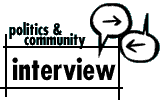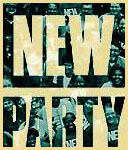

Adam Glickman
interviewed by Anthony Qaiyum on August 9, 1996
Contact the New Party
Web: http://www.newparty.org
Email: [email protected]
Phone: (800) 200-1294
Relevant Resources
New Party Profile
An explanation of the party's structure.
Thinking About '96
The New Party take on the potential of the November elections.
New Party Funding
The comings and goings of the party's shoestring budget.
New Party Chapters
See if there's a New Party chapter in your area.

Adam Glickman, 24, is the Communications Director of the New Party. He first became active in politics as an undergraduate at Wesleyan University, where he fought battles for need-blind admissions, workers' rights, affirmative action, and benefits for same-sex partners.
Tripod: Can you give me a little history of how and where the New Party started?
Adam Glickman: Sure. The New Party started in the early 90's. It opened its doors in 1992 after people talked about it for a few years. Many of the originators were involved in the Jackson '88 campaign, and were disappointed that it didn't turn into a ongoing progressive political organization the way people had envisioned. They saw the Democratic Party losing more frequently to the Right, increasingly abandoning its core constituency of blacks, labor, and so on. They felt the need to develop a counterweight to the Christian Coalition -- something that would do for progressives what the Christian Coalition has done for conservatives. But they didn't want to do something that would, in the short term, hurt Democrats and help elect Republicans. So they started with the strategy of building from the grass roots, running people for local races first, and then moving up only as resources and competence increase.
Tripod: Aside from ideology, is it the local strategy that separates you from another third party like the Reform Party?
AG: I would say it's our strategy to start at the local level. It's our program and our structure. We're not controlled by one person. We're a membership-based organization. People join, they pay dues, and they get some power in the organization. Local chapters -- consisting of dues paying members -- vote on who to nominate, what campaigns to run, and what issues to focus on. It doesn't come down from the top. There is an executive council made up of members elected from all the chapters which makes national policy decisions, and so on. But there is a lot of local autonomy and internally democratic membership-based decision making that differentiates us from the Reform Party and the two major parties as well.
Tripod: Couldn't you end up with a situation where the New Party affiliate in one place is significantly different than the New Party affiliate in another area?
AG: Well, we do have the national executive council that establishes principles to which all chapters are bound. It sets policies on national issues and national strategies that supersede the needs of local autonomy. For example, the executive council voted not to endorse Ralph Nader, so now no local chapter of the New Party can endorse Ralph Nader. We have to maintain a balance between wanting to have cohesion and wanting to have some internal democratic local autonomy. We're moving along, trying to figure out what the best balance is. We've only had real substantial activity in a number of cities and states for the last couple of years. We're learning as we go.
Tripod: Do you have a national platform?
AG: There's a national statement of principles, which is somewhere in between general and specific. We haven't done a lot of work on a national platform, but we're starting doing more of that this year. We've done a lot of work at the local level in various places on developing a program around urban economic renewal issues -- land use, zoning issues, housing issues, education, school reform. Most of our program development work has been focused on the local areas where we are running candidates. We're starting to go deeper into developing a national program, but we do have this set of principles which are reasonably specific.
Tripod: How large is the party right now?
AG: About 8,000 members. We have about 20 full time staff and about 15 chapters in 10 states.
Tripod: Obviously, funding must be a major issue.
AG: Funding is always a major issue. The vast majority of our funding is from individual membership donations. About 70 percent of our donations are under $200.00. We also have lots of people who are giving us automatic monthly donations through credit cards or bank drafts, sort of like union dues. This gives us a regular source of income. We have about 1,000 out of our 8,000 members who contribute in that way.
Tripod: As a party that's interested in campaign finance reform, you obviously have limits on the amount of money that can be given.
AG: Right. We don't take any corporate PAC or corporate money. We haven't really had to set limits yet on individual donations, but presumably we will at some point.
